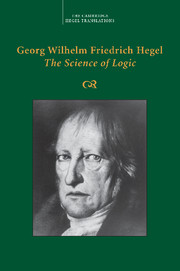Chapter 2 - Chemism
Published online by Cambridge University Press: 30 September 2021
Summary
In objectivity as a whole chemism constitutes the moment of judgment, of the difference that has become objective, and of process. Since it already begins with determinateness and positedness, and the chemical object is at the same time objective totality, the course it follows next is simple and perfectly determined by its presupposition.
THE CHEMICAL OBJECT
The chemical object is distinguished from the mechanical in that the latter is a totality indifferent to determinateness, whereas in the chemical object the determinateness, and hence the reference to other, and the mode and manner of this reference, belong to its nature. – This determinateness is at the same time essentially a particularization, that is, it is taken up into universality; thus it is a principle – a determinateness which is universal, not only the determinateness of the one singular object but also of the other. In the chemical object there is now, therefore, a distinction in its concept, between the inner totality of the two determinacies and the determinateness that constitutes the nature of the singular object in its externality and concrete existence. Since in this way the object is implicitly thewhole concept, it has within it the necessity and the impulse to sublate its opposed, onesided subsistence, and to bring itself in existence to the real whole which it is according to its concept.
Regarding the expression “chemism” for the said relation of the nonindifference of objectivity, it may be further remarked that the expression is not to be understood here as though the relation were only to be found in that form of elemental nature that strictly goes by that name. Already the meteorological relation must be regarded as a process whose parts have more the nature of physical than chemical elements. In animate things, the sex relation falls under this schema, and the schema also constitutes the formal basis for the spiritual relations of love, friendship, and the like.
On closer examination, the chemical object is at first a self-subsistent totality in general, one reflected into itself and therefore distinct from its reflectedness outwards – an indifferent basis, the individual not yet determined as non-indifferent; the person, too, is in the first instance a basis of this kind, one that refers only to itself.
- Type
- Chapter
- Information
- Georg Wilhelm Friedrich Hegel: The Science of Logic , pp. 645 - 650Publisher: Cambridge University PressPrint publication year: 2010

